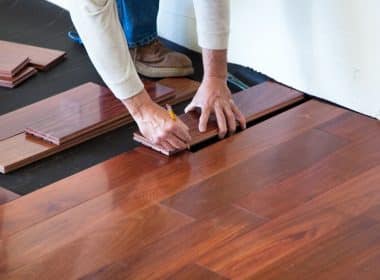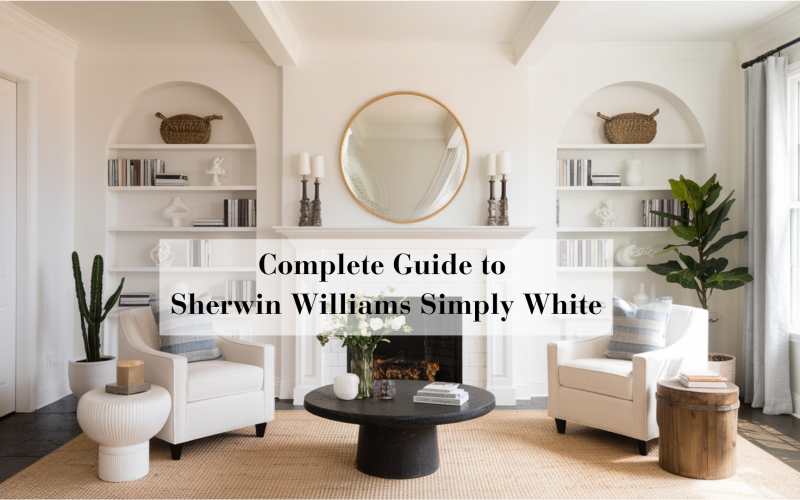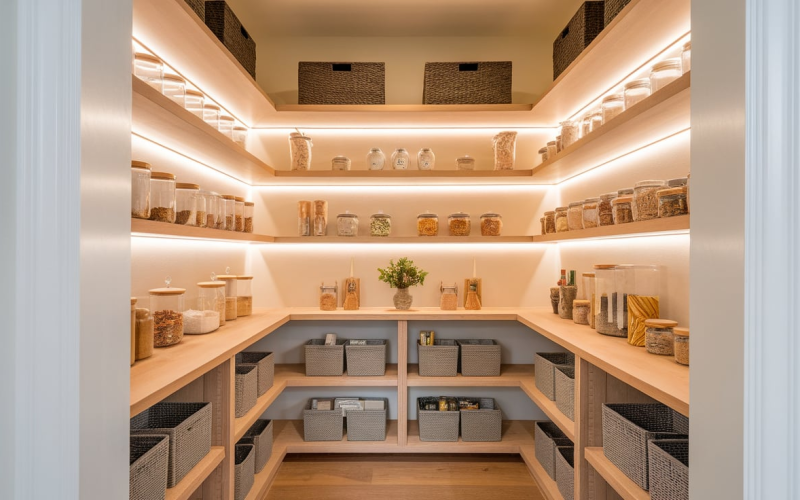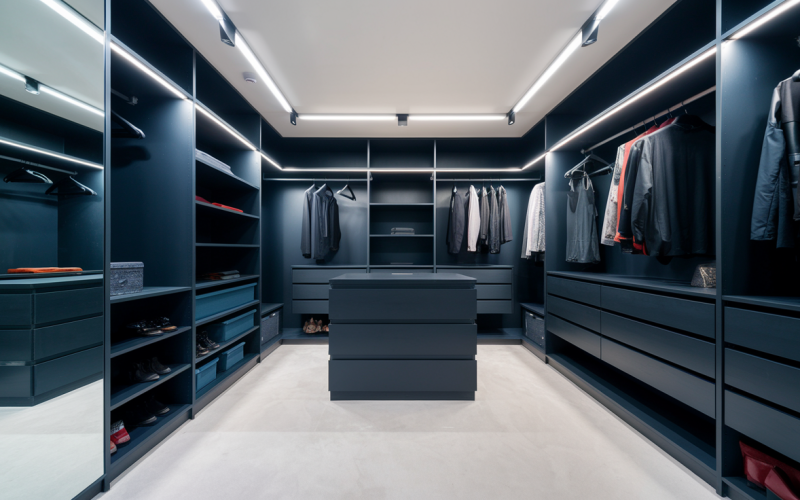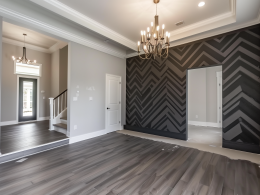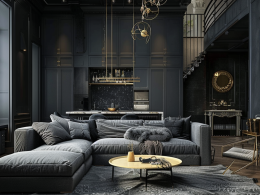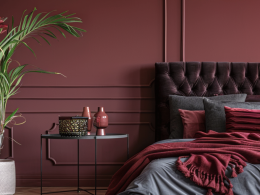White paint seems like a simple choice, but picking the right shade can transform your home.
Sherwin Williams Simply White (SW 7021) stands out among white paints with its unique qualities and special features.
This paint offers a bright, clean look with subtle, cool undertones that make it both fresh and warm.
Many homeowners choose it for bedrooms, living areas, trim, and more, thanks to its flexibility and clean finish.
This guide will cover everything you need to know about SW Simply White:
- Its key traits
- Best uses to
- Application tips
- How it differs from other white options
Let us get started!
Understanding Sherwin-Williams Simply White
Sherwin-Williams Simply White (SW 7021) offers unique qualities that set it apart from other white options on the market.
Color Characteristics
Simply White stands out with its cool violet undertones, giving it a gentle but solid presence.
This bright white works well as a flexible backdrop when paired with stronger or more vibrant colors.
The subtle purple hint helps it avoid feeling too stark or clinical while still maintaining a clean appearance in any room.
Best Use Cases
This versatile white paint fits many areas throughout your home.
It’s commonly used for:
- Bedroom walls where a bright, clean look is wanted
- Trim work throughout the house
- Ceilings
- Bathrooms where its cool tones complement fixtures
The paint’s balanced tone makes it suitable for both small spaces that need brightening and larger areas that need a cohesive look.
Comparison with Other Whites
| White Paint | Undertones | Brightness | Best Uses |
|---|---|---|---|
| SW Simply White | Cool violet | Higher LRV (brighter) | Bedrooms, modern spaces |
| SW Alabaster | Warm yellow | Medium LRV | Traditional spaces have a softer look |
| BM Simply White (OC-117) | Yellow tints | High LRV | Warmer spaces, trim |
| SW Pure White | Neutral, less violet | Medium-high LRV | Versatile, clean look |
Best Uses for Sherwin-Williams Simply White
Simply White works well on living room walls, creating a clean canvas that lets furniture and art pieces take center stage.
It bounces light around the room, making it feel open while providing just enough warmth to be welcoming.
In Kitchens

Simply White brightens the space and gives the cabinets a clean look.
It pairs well with marble countertops and stainless steel appliances while making the room feel larger.
For Bedrooms

Simply White creates a calm, restful atmosphere while keeping the space feeling airy.
It serves as an ideal base for layering textures and accent colors.
In Bathrooms

The cool undertones in Simply White work well with bathroom fixtures. They create a clean, bright feeling and make small bathroom spaces appear larger and more open.
The paint’s balanced tone makes small spaces feel larger while still working well in more spacious rooms.
In the Living Room with Trendy Pairings

Simply White works well on living room walls, creating a clean canvas that lets furniture and art pieces take center stage.
It pairs well with bold colors, such as navy blues, for a classic look and forest greens for natural, balanced spaces.
With neutrals, it looks clean alongside light grays and warm with taupes.
The paint works with various metal finishes – brushed nickel looks fresh against it, matte black creates contrast, and brass adds warmth to balance its cooler undertones.
Trim and Accent Ideas

Simply White creates clean lines that frame rooms nicely on trim, molding, and ceilings.
When used on ceilings, it brightens spaces without drawing too much attention.
It adds definition to crown molding and baseboards without overwhelming the design. Window frames in this color help maximize light reflection.
Many designers use this white for all trim to maintain visual flow throughout a home, even with changing wall colors.
SW Simply White vs. BM Simply White
While sharing the same name, these two popular white paints from competing brands have notable differences that can significantly impact your final result.
Understanding these distinctions will help you select the right option for your specific needs.
| Feature | Sherwin-Williams Simply White (SW 7021) | Benjamin Moore Simply White (OC-117) |
|---|---|---|
| Undertones | Cool violet | Warm yellow |
| Base White | There is more blue in the base | There is less blue in the base |
| Appearance | A gentle but solid presence | Creamy, brighter finish |
| LRV (Brightness) | Medium-high | Higher (appears whiter/brighter) |
| Best Rooms | Modern spaces, rooms with blue/purple accents | Traditional homes, north-facing rooms |
| Works With | Cooler color schemes | Wood tones, warm decor |
| Matching | It cannot match the BM version exactly | Popular go-to for walls/trim/ceilings |
| Designer Notes | Good for bright bedrooms | Some designers have moved away from it recently |
| Character | Clean, fresh with subtle coolness | Warm, inviting, and slightly creamier |
How to Achieve the Perfect Finish with Simply White
Getting the best results with Sherwin-Williams Simply White requires proper preparation and application techniques.
Application Tips
Start by cleaning the walls and filling any holes with spackle. Apply painter’s tape for clean edges. Stir the paint well before using it, and apply a good primer first.
When painting, work in small sections using the “W” technique – paint in a W shape, then fill it in without lifting the brush too often.
Apply at least two coats, allowing proper drying time between each.
Tools Needed
Use a high-quality 2-inch angled brush to cut around the edges and a 3/8-inch nap roller cover to smooth the walls.
A roller with an extension pole helps reach high areas. Paint trays with liners make cleanup easier, and good painter’s tape prevents bleeding.
Keep clean rags handy for quick fixes of drips or mistakes.
Choosing the Right Finish
Simply White comes in several finish options:
- Flat/matte: Hides imperfections but is harder to clean; best for bedrooms and ceilings
- Eggshell: Slight sheen, more durable; good for living rooms and hallways
- Satin: Soft shine with moisture resistance; ideal for kitchens and children’s rooms
- Semi-gloss: Noticeable shine, easy to clean; excellent for trim and bathrooms
- High-gloss: Maximum shine and durability; best for trim in busy areas
For most homes, eggshell or satin works best for walls, with semigloss for trim and doors.
Pros and Cons of Sherwin-Williams Simply White
Before committing to Simply White for your entire home, consider its strengths and potential downsides to determine if it meets your specific needs.
Benefits
Simply White offers cool violet undertones that create a clean, fresh look while still feeling warm enough for comfort.
It serves as an excellent backdrop for other design elements.
- Brightens spaces without feeling stark
- Works on walls, trim, and ceilings
- It suits many design styles
- Complements stronger colors well
Drawbacks
In certain lighting conditions, Simply White may not perform as expected, particularly in spaces with limited natural light.
- Can feel flat in poorly lit rooms
- It might look too bright in sunny spaces
- Sometimes hard to match with other whites
- It shows dirt and marks more readily
- Violet undertones may clash with warm furnishings
How to Maintain and Care for Simply White Painted Surfaces
Keeping your White walls looking clean and bright requires regular attention.
With proper care, this popular color choice can stay looking fresh for years to come.
Cleaning and Touch-Up Tips
For day-to-day cleaning of Simply White surfaces, use a soft, lint-free cloth slightly dampened with water.
For tougher spots, mix a small amount of mild dish soap with warm water. Avoid harsh chemicals or abrasive tools that might damage the paint finish.
For small marks, keep a small container of the original paint handy for quick touch-ups using a thin artist’s brush.
Handling Wear and Yellowing
Over time, white paint can show signs of age through slight yellowing or wear. To slow this process, limit direct sunlight exposure by using window treatments.
Proper ventilation in kitchens prevents cooking oil residue from settling on the paint. Good airflow in bathrooms helps prevent moisture-related issues.
When repainting becomes necessary, be sure to properly clean and prime the surface first for the best results.
Common Mistakes to Avoid When Using Simply White
Even small mistakes can affect your final results when working with Simply White.
Being aware of these common pitfalls will help you achieve the look you want.
Underestimating Undertones
Simply White isn’t just plain white. It has specific undertones that change in different lighting.
Test the color at various times of day before committing.
Benjamin Moore’s version has subtle yellow undertones, while Sherwin Williams’ has cool violet undertones.
These differences matter when matching with other elements in your room.
Skipping Proper Surface Preparation
White paint shows every bump and flaw. Before painting, fill holes, sand uneven spots, and clean walls. Use a quality primer, especially over dark colors or stains.
Good preparation ensures a smooth finish that lets White look its best.
Conclusion
Simply White offers clean, bright walls that work in many home settings.
This color creates rooms that feel open and fresh without being harsh or cold.
When choosing between paint brands, consider the subtle differences – Benjamin Moore’s has yellow hints, while Sherwin Williams’ version leans slightly purple.
For best results, test samples in your actual space under different lights before buying gallons.
Apply it using quality tools and good techniques for an even finish.
Comment and share your queries with us!



